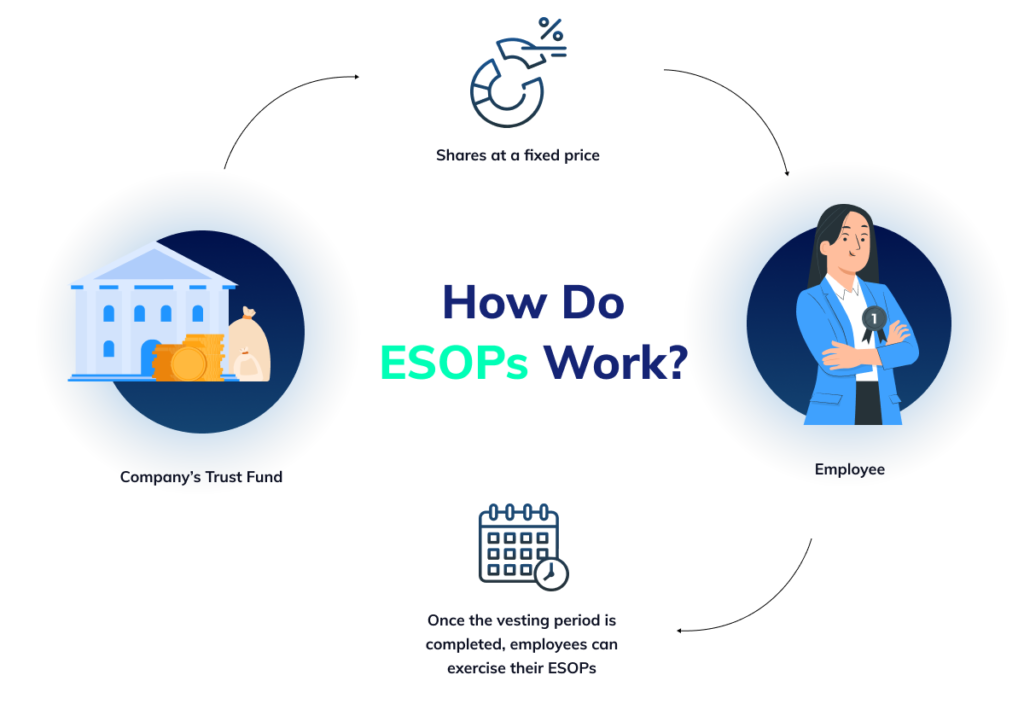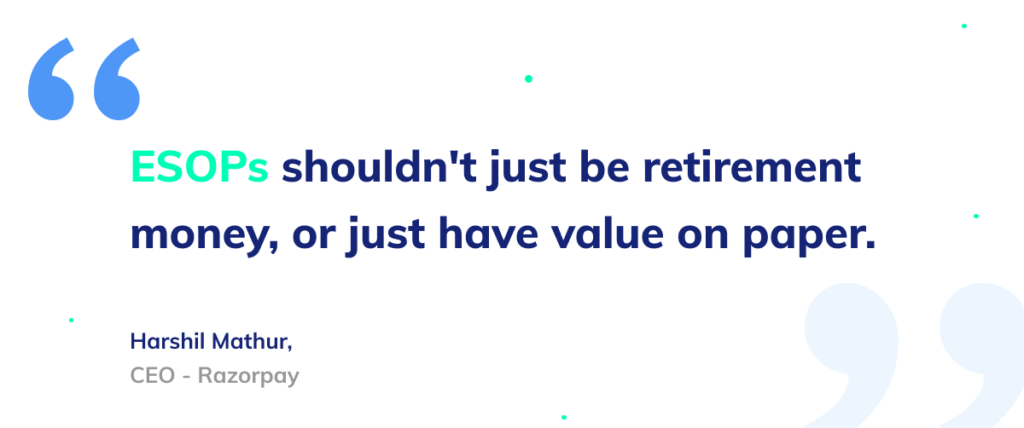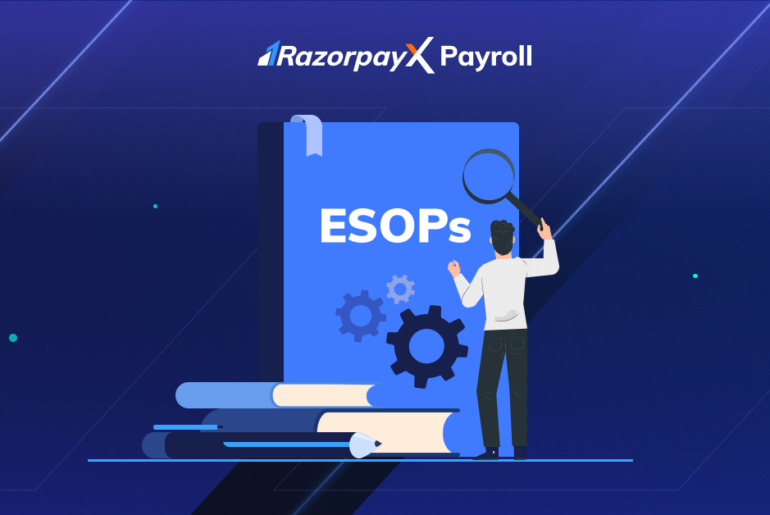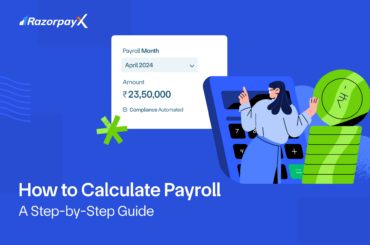ESOPs (Employee Stock Ownership Plans) along with other personalised benefits like employee health insurance and better career growth opportunities play a significant role in attracting and retaining top talent.
Besides the in-hand salary, startups have found ESOPs to be an attractive motivation for joining a company. ESOPs not only allow employers to sweeten the pot, especially if they can’t afford very high compensation packages right off the bat, but they also encourage a feeling of ownership in the employee.
In this blog, we decode everything about ESOPs. Read on.
Table of Contents
What is ESOP?
ESOP stands for Employee Stock Ownership Plans. They are a type of employee compensation plan wherein employees can earn equity in the company over a period of time.
Under the ESOP contract, employees get the option of converting their ESOPs to stocks at a predefined rate over a period of time (vesting/option period).
It is important to note that ESOPs do not give employees stock ownership right away.
How do ESOPs work?
Under an ESOP plan, the employer allots certain stocks to the employee from their trust fund. Now, as and when the employee completes the predefined vesting period, they can exercise their ESOPs.
Employees need to work for the organisation for the specified vesting period to become eligible to exercise their ESOPs. If an employee leaves before the completion of the vesting period, they would not be able to exercise the ESOP and convert it into the company’s stock.
 The three most important things to keep in mind for any ESOP plan are –
The three most important things to keep in mind for any ESOP plan are –
- The number of shares that the employee can buy
- The price at which the shares can be bought
- The period after which the shares can be bought
Example to understand ESOPs
Say Sapna Private Limited offers its employees the following ESOP-
- 100 shares @Rs.100
- Option/vesting period – 5 years
This means that after 5 years if the employee is still on Sapna Private Limited’s payroll, they can buy 100 shares Rs.100 each, irrespective of the market value of the company’s stock.
Some small businesses and startups allow vesting at a shorter interval: for example, 100 shares vest over 5 years proportionately: i.e., every year, the employee earns 20 ESOPs.
Features of ESOPs
- ESOPs are given free of cost to employees. They are a part of employee’s CTC (Cost to company) structure
- The vesting date is when the employee can exercise their ESOP and convert it into the company’s shares. Grant date, on the other hand, is the date when the ESOP is granted through a formal agreement between the employer and the employee
- ESOPs can be exercised partially or fully
- Employers can give ESOPs to selective employees or to all depending on their recruitment strategy
- In some cases, ESOPs can be exercised in a phased manner, i.e. in instalments over a specified period
- The price at which employees can buy a company’s shares through ESOPs is called the exercise price or grant price
- It’s not mandatory for employees to exercise their ESOPs

Types of ESOPs
-
Employees Stock Option Schemes (ESOS)
ESOS is the most common employee ownership plan, and under this scheme, employees can buy stocks at a given price after the vesting period. This plan doesn’t obligate the employees to invest in the company’s stocks.
-
Employee Stock Purchase Plans (ESPP)
Under these plans, employees can buy the company stocks at a price lower than the market value. The plan terms including price, vesting period etc. are predetermined. Once the employee exercises their ESOPs, they become company’s shareholder.
-
Restricted Stock Award (RSA)
In this scheme, employees are awarded a certain number of shares subject to the fulfilment of specified conditions. If the employee fulfils the underlying conditions, they can enjoy ownership of the stock. If, however, the condition is not met, the awarded stock is forfeited. What sets this scheme apart from the others is that the employee becomes the stock owner right from the time it is awarded.
-
Restricted Stock Unit (RSU)
This scheme works similar to RSA. The only difference is that the employee does not become stock owner took unless the specified condition is fulfilled and the stock is actually issued to him.
-
Phantom Equity Plan
Under these schemes, employees are allotted notional shares of the company at a predefined rate. The grant or exercise price is recorded in the books of the company but not actually paid to the employee.
On the vesting date, the employee is paid the profit they would have earned on exercising the shares. Thus, the employee does not exactly get the possession of shares but earns a profit from the notional buying of shares at a discounted price.
Benefits of ESOPs
While ESOPs form a part of the employee’s CTC, they are beneficial to both employers and employees.
How does an employer benefit from ESOPs?
For employers, ESOPs can be the deal-breaker in talent acquisition. Here’s how –
Acquiring top talent
When funds are often low during the company’s initial years, ESOPs aim to bridge the gap in compensating the employees. If the employees believe in the potential of the company’s growth, they accept ESOPs as part of their compensation package to acquire the company’s stocks at reduced rates. This helps in acquiring good talent at a reduced initial cost.
Increase employee ownership
When employees have a stake in the company’s ownership, they are self-motivated to put in their best efforts for maximum productivity. After all, the better the profitability, the better the company’s stock value and the higher the profits that the employees can earn.
Employee retention
ESOPs help in employee retention. Since employees are allowed to cash in their stock options only after the vesting period, they tend to stay with the company with a view to encash their stocks. This increases retention and also cuts down attrition rates, especially in tech, where attrition can be alarmingly high.
[Also Read: Payroll Compliance Sourcebook for Businesses]
How do employees benefit from ESOPs?
ESOPs benefit employees due to the following reasons –
Higher profits at reduced rates
They help employees acquire good stocks at a reduced rate. Employees can, then, hold onto these stocks for long-term returns or sell them off at a higher market value to earn profits on their stockholding.
Additional Income Source
By becoming shareholders, employees get voting rights in the company’s management. They also get to earn a dividend on their stockholding which serves as an additional income.
Job Stability
Due to the vesting period, employees also get job stability which, in turn, drives up employee satisfaction.
Taxability of ESOPs
– There is no tax implication in allotting ESOPs to prospective talent. However, if you incur expenses on ESOPs, such expenses would be allowed as a tax-deductible expense from your business income.
– When the employee exercises ESOPs, they are taxable as per the employee’s tax bracket.
– If there’s a profit after the employee sells the shares, it is considered as capital gains. If the shares are sold within a year, a 15% capital gains tax must be paid, just like with any other purchase or sale of stock.
– If the capital gains are long-term (more than a year) 10% tax has to be paid without indexation benefit or 20% tax has to be paid with indexation benefit.
What do employers need to know before opting for ESOPs?
Though ESOPs can help employers attract good talent, especially in a cash-strapped economy, there’s a lot to consider before offering it to the employees.
Firstly, there are specific legal rules and regulations governing the working of ESOPs. Businesses have to, comply with all the rules to run ESOPs legally and without facing non-compliance penalties.
Moreover, outsourcing ESOP governance and monitoring it internally incurs additional costs. Employers, thus, need to keep the cost structure in mind when introducing the concept of ESOPs in their organisation.
Way forward for ESOPs in the startup ecosystem
There have been many success stories about employees making attractive profits through their ESOPs. ESOPs have, thus, become quite popular in recent times when startups are driving business trends in India.
Startups are particularly hard-pressed for sufficient capital in their establishment phase. As such, ESOPs have proven to be the ideal compensation scheme for hiring and retaining talented employees.
Over to you
With startups having offered $700 million worth of ESOPs since January 2020, there’s no doubt that ESOPs are here to stay. But, businesses need to understand that there’s a lot more than just offering lucrative benefits to maintain employee happiness and satisfaction.
Seamless on-time salary and bonus payments, career growth opportunities, a trustworthy employee health insurance are some of the benefits that top the lists to retain talent.
Small businesses and startups can easily manage bonus payments & salary hikes for their employees with India’s only fully automated payroll software – RazorpayX Payroll, along with
- Automating salary disbursals & compliance payments like PT, ESI, PF, and TDS
- Providing employees with a self-service portal that lets them access their payslips, apply for leaves and more
- Insuring employees’ health with best-in-class group health insurance
And a lot more.
So get started and simplify your salary payments along with incentives & bonus payments like never before.





